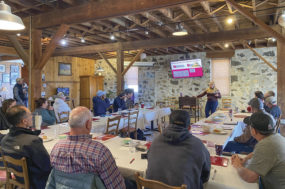I have attended several professional development workshops to educate myself and hopefully be a better financial and lending resource to my customers. Between training and formal education, I have learned minute details of finance and business management. In all my work, I have utilized a team of trusted advisers in my personal and professional life.
Of late, these continuing education workshops indicate there is a crisis in the ag production world that overshadows the passion and heritage of the family farm in America. It is not a crisis of commodity prices, unrealistic regulatory overreach, inflationary pressures or high interest rates. This crisis is the overall mental health of our ag producers who labor each day to [each] feed 166 people annually, according to the American Farm Bureau.
One stark statistic that begs our attention regarding mental health is the fact that farmers are 3.5 times more likely to die by suicide than the general population in the U.S., according to the National Rural Health Association. Depression rates also are similarly higher among ag producers compared to the general population. The workshops mentioned above are increasingly more likely to discuss this mental health issue. The Idaho Farm and Ranch Center seminar in January of this year did an excellent job of providing resources to address this crisis. This is a subject that is becoming “OK to talk about” in the circles of ag production. This is a good thing.
I am not a qualified mental health professional. I am a finance professional who works with great ag producers I care about. However, the following is what I have observed as a financial (and sometimes actual labor) participant in the ag profession. As with life, the unknowns in ag production cause stress. Many producers are excellent technical operators; however, there are peripheral issues they are not as knowledgeable about, and many of those unknowns may cause undue stress. First, what are the main and peripheral stress sources in ag production? Experts identify these potential stress areas as production risk, market risk, financial risk, legal risk and human risk. Let’s look at these and identify sources that may alleviate these unknowns from becoming undue stressors.
Production risk
Most producers are pretty good at production, and the risks here are mostly external, like drought, pestilence, fire or the like. Also, most producers have a trusted crop consultant or animal science professional to help eliminate the guesswork and accompanying stress from the unknowns. If you don’t have a trusted consultant, there are several sources to find one. Vendors or your extension office are great places to start.
Market risk
Marketing an agricultural product is equally important to producing the product, and a producer should have multiple marketing plans for commodities. The biggest stress I see in this area is: One farmer has sold a certain crop to his neighbor for years at a fair price. Suddenly the neighbor can’t pay for a crop that has been delivered because of hard times. This stress from the buying farmer then affects the selling farmer, and collecting a bad debt from a neighbor causes the stress for both parties to escalate exponentially. Multiple marketing plans can help reduce stress in marketing products.
Financial risk
Ag production involves lots of capital. A fair amount of this capital is borrowed for operating expenses, machinery and land. Today, a million-dollar combine is commonplace. Obtaining this capital with terms that allow repayment and a reasonable living is a difficult task. When structuring large loans for equipment, land and operating expenses, a producer should have a lender to borrow from and another lender to ask questions of.
The first lender is making a loan. The second lender is not obligated or restricted by company or industry policy to offer candid advice as to the efficacy of a certain loan. We seek second opinions in the medical community often. Why would we not seek second opinions in finance of millions of dollars? This second finance expert could be a banker or your accountant. Both can eliminate undue stresses in financing a family farm or ranch.
Legal risk
Most ag producers are good to seek legal advice. Usually, most producers are not lawyers, and that may be why they seek advice to establish different operating companies or develop a succession plan for the family farm. Some of the smaller things may not get the attention of a lawyer, but should. When issues arise with human resource (HR) law, they can significantly contribute to stress for an operator. Yet, few producers have used lawyers to establish guidelines for their HR policies. The same can be said for trade transactions or regulatory compliance such as food safety. A producer can prevent a lot of stress if a lawyer is a trusted adviser in the operation.
Human risk
The human risk component is elevated as farmers work long hours in isolated locations away from friends and family. This isolation can amplify stresses because there is no one to act as a sounding board to listen to a producer vent frustration. Another human stress is supervising employees. Most farm operators have not had access to formal education or workshops on personnel management or supervision. A lot of discussion may happen in the heat of a moment – and that, by itself, is a stress elevator.
In short, building a team of confidential trusted advisers will assist the farm operator to address stress in his or her workplace. At minimum, those advisers would include a good crop consultant, a marketing specialist or group, a financial adviser (for example, an accountant or banker from whom the producer does not borrow), a legal specialist/lawyer and a personnel management specialist. These individuals can eliminate the unknowns in areas where the producer is lacking experience and knowledge. The unknown can cause false stress or exacerbate mistakes that can be severe enough to threaten the continuation of the business. These individuals are not necessarily on the payroll, but they are worth their weight in gold versus the potential adverse outcomes.
Lastly, stress will shorten lifespans and reduce the quality of life for anyone. Stress can damage personal relationships, sometimes beyond repair. It is alarming that ag producer mental health is significantly worse than the general population. There is help available. The proactive team-building of trusted advisers is a start. There are numerous helps through associations like Farm Bureau, the Idaho Department of Agriculture or your physician. It is OK to talk about these things because the alternative is not OK.





